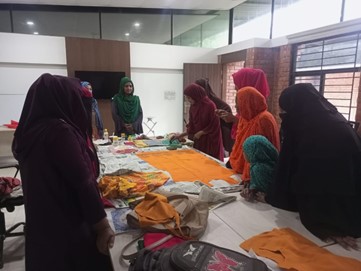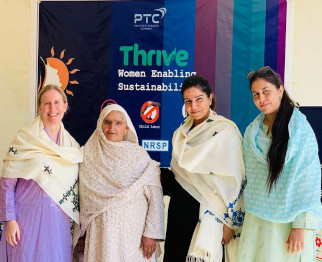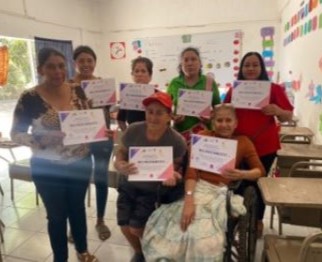Supporting Women in Rural Communities
Women’s empowerment is one of the key focus areas of our farmer livelihoods programme, which is crucial for inclusive and sustainable economic growth in rural communities
Lack of women’s empowerment in rural communities is a well-known root cause of child and forced labour. In 2023, BAT has undertaken a review of our existing approach and have developed a Women’s Empowerment Framework focusing on areas such as women and girls’ welfare and health, capacity building and how to create opportunities to improve livelihoods more generally – ones that bring the men along and help address cultural, or other barriers. We are both increasing the number of farmers engaged in women’s empowerment training and continuing with specific focused initiatives in countries where a need has been identified via our Thrive and Human Rights Impact Assessments .
Promoting gender equality initiatives and empowering rural women through decent work and productive employment, not only contributes to inclusive and sustainable economic growth, but also enhances the effectiveness of poverty reduction and food security initiatives, and can support climate change mitigation and adaptation efforts.
BAT’s Women’s empowerment Training Programme
At BAT, we source our tobacco from over 81,000 contracted farmers worldwide and support these farmers to enhance their and wider communities’ livelihoods by promoting women’s empowerment training and programmes. We do this by partnering with local organisations and stakeholders that can support us to deliver initiatives to empower women on farms.
In 2022, 29,366 people were reported to be engaged in women’s empowerment training in our tobacco supply chain¹.
Some examples of these actions around the world:
 In Brazil, "Nós por Elas" ("Us for Them"), a tobacco sector program established in 2017 by the Growing Up Right Institute, addresses gender issues in rural areas and raises awareness of women's roles. The program promotes good practices by featuring young women who graduated from the Apprenticeship Programme on local radio stations.
In Brazil, "Nós por Elas" ("Us for Them"), a tobacco sector program established in 2017 by the Growing Up Right Institute, addresses gender issues in rural areas and raises awareness of women's roles. The program promotes good practices by featuring young women who graduated from the Apprenticeship Programme on local radio stations.
Through seven editions, 52 young women have participated in 27 radio programs, sharing their experiences to empower and inspire others. The program emphasizes developing communication skills to help them become advocates for young rural women and the broader community.
Project SHELAI
Project SHELAI (Sustainable Household Enterprise for Livelihood & Accelerated Income) empowers farm women by providing essential sewing skills. From March to April 2024, 36 women in the district of Rangpura received training in 15 cutting and sewing techniques, along with communication strategies to promote their skills and reach clients. This transformative program, focused on handicrafts, fostered both financial and personal growth.
 "Before the sewing training,
"Before the sewing training,
I felt limited in contributing financially to my family.
I didn’t realize how much it would change my life. The training taught me how to sew and communicate with clients. I now receive many orders and am financially independent. I can support my family and even employ a few local women. This project has given me confidence, financial stability, and a sense of purpose. I’m grateful for the opportunity to transform my life and contribute to my community." – Beneficiary, Jayanta Rani
Project Shikor
Started in 2021, Shikor is a community club and training facility aimed at improving the livelihoods of rural farmers by providing skill development opportunities. To date, 99 people, including 71 women, have completed financial literacy training, and approximately 150 women have finished Sewing & Cutting courses.
 "Not long ago, I was just a housewife with little understanding of financial matters. Savings, DPS (Deposit Pension Scheme), and managing our family’s finances were foreign to me. I was afraid of banks and didn’t know how to save or take a loan. Everything changed when I saw women around me become financially stable through Shikor courses. Inspired, I enrolled in a financial literacy course, and now I manage two bank accounts, save regularly, and even pay bills via bKash. Together with my husband, we plan to invest in a cow or other ventures to secure our future. My journey from financial uncertainty to stability is a testament to the power of education and determination." – Beneficiary, Mst. Mukta Khatun
"Not long ago, I was just a housewife with little understanding of financial matters. Savings, DPS (Deposit Pension Scheme), and managing our family’s finances were foreign to me. I was afraid of banks and didn’t know how to save or take a loan. Everything changed when I saw women around me become financially stable through Shikor courses. Inspired, I enrolled in a financial literacy course, and now I manage two bank accounts, save regularly, and even pay bills via bKash. Together with my husband, we plan to invest in a cow or other ventures to secure our future. My journey from financial uncertainty to stability is a testament to the power of education and determination." – Beneficiary, Mst. Mukta Khatun
"I’ve always been passionate about making fabrics and garments, but financial constraints and household duties kept me from pursuing my skills. My family relied on my husband’s income, which wasn’t enough. In 2022, I heard about Shikor’s training programs and enrolled. The hands-on training in sewing, cutting, and entrepreneurship helped me start a small business from home. My custom garments quickly gained popularity, and now I earn around 37.5 to 45.0 GBP per month. This income supports my family and allows me to fulfill dreams, like buying gold ornaments and goats. Shikor has truly changed my life." – Beneficiary, Mst. Masuma Khatun
 Over the years, Leaf Pakistan has focused on empowering farming communities by including women as key contributors, particularly in rural agriculture. Customized training content on women's empowerment was developed, covering Child Health & Education, Farm Safety & Kitchen Gardening and Farm Economics.
Over the years, Leaf Pakistan has focused on empowering farming communities by including women as key contributors, particularly in rural agriculture. Customized training content on women's empowerment was developed, covering Child Health & Education, Farm Safety & Kitchen Gardening and Farm Economics.
These trainings were delivered in partnership with the National Rural Support Program (NRSP) through their female staff in all tobacco-growing regions.
In 2022, Pakistan Leaf partnered with NRSP to promote community development through women's empowerment, providing training to 7,800 contracted farmer families across all leaf regions. These sessions covered topics such as kitchen gardening, child labor prevention, and health and safety, with 30% of families receiving kitchen gardening seeds to support their household income.
By 2024, the program expanded significantly, reaching 100% of contracted farmer families across all regions. In addition to the trainings, 2,500 booklets on child education awareness and 3,500 kitchen gardening seed packets were distributed, further demonstrating Pakistan Tobacco Company (PTC) Leaf's commitment to women’s empowerment.
 In Kenya, following focus group discussions with farmers and their spouses to gain insight into what matters to them, women’s development and health was identified as a key area in catalyzing the advancement of rural women in society, achieving improvements in household incomes and preventing child labor.
In Kenya, following focus group discussions with farmers and their spouses to gain insight into what matters to them, women’s development and health was identified as a key area in catalyzing the advancement of rural women in society, achieving improvements in household incomes and preventing child labor.
Following this engagement, BAT Kenya rolled out the Rural Women Development Programme (RuWDep) in 2023, by training 285 women in the first phase. The RuWDep targets to engage more than 2,000 women by 2027 from Oyani and Malakisi tobacco leaf growing communities who are either women farmers contracted by BAT Kenya or spouses of contracted farmers.
Through the programme BAT Kenya aims to champion women’s rights and welfare, capacity building on sustainable agriculture and business management, as well as entrepreneurship development.
 In 2024, Leaf Mexico launched the Women Empowerment initiative with the goal of strengthening the autonomy, psycho-emotional well-being, and resilience of women directly or indirectly connected to tobacco farming. A total of 43 women participated, with 62% of full attendance.
In 2024, Leaf Mexico launched the Women Empowerment initiative with the goal of strengthening the autonomy, psycho-emotional well-being, and resilience of women directly or indirectly connected to tobacco farming. A total of 43 women participated, with 62% of full attendance.
The program covered key topics such as understanding women’s empowerment, recognizing forms of violence against women, emotional resilience, addressing women’s invisibility, and financial empowerment. One of the primary insights was the value of creating community spaces where women felt safe to share challenges and celebrate each other’s progress, fostering a supportive network.
Building on these learnings, Leaf Mexico has integrated Women Empowerment into the Living Income program in partnership with FUNDES (Fundación para el Desarrollo Latinoamérica). In 2025, a pilot with 140 tobacco families will be launched, aiming to map and enhance women’s visibility and participation in our supply chain. This 4-year initiative (2025-2028) will include a baseline study of women’s roles and an emphasis on family income growth through inclusive practices.
¹ 'Tobacco Supply Chain', refers to the tobacco supplied by our directly contracted farmers and those of our strategic third party suppliers, who participate in our annual Thrive assessment, representing over 80% of the tobacco purchased by BAT Group companies by volume in 2022.


